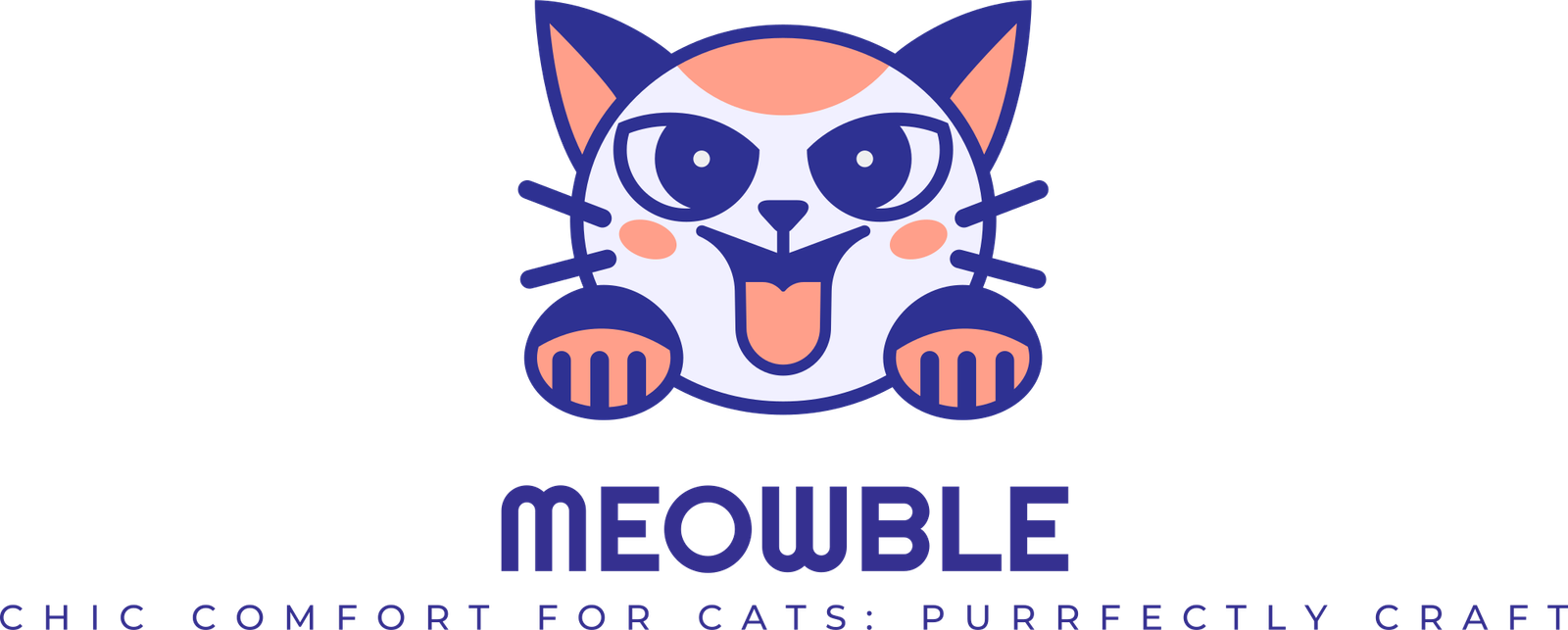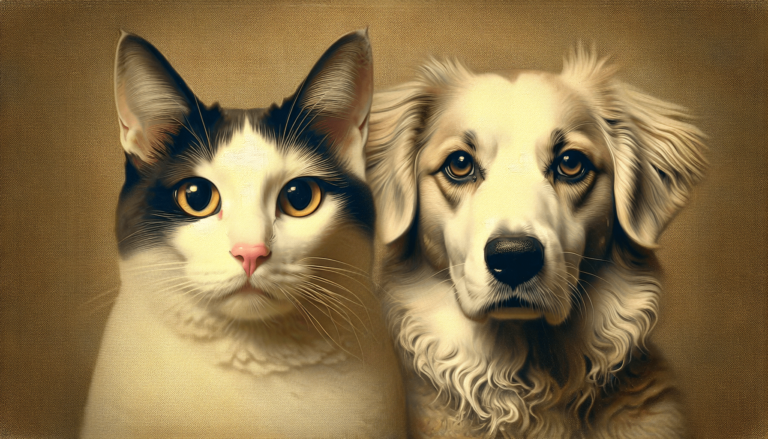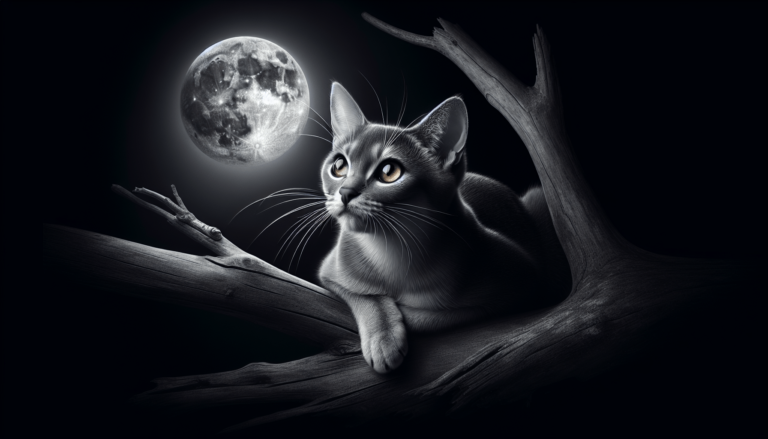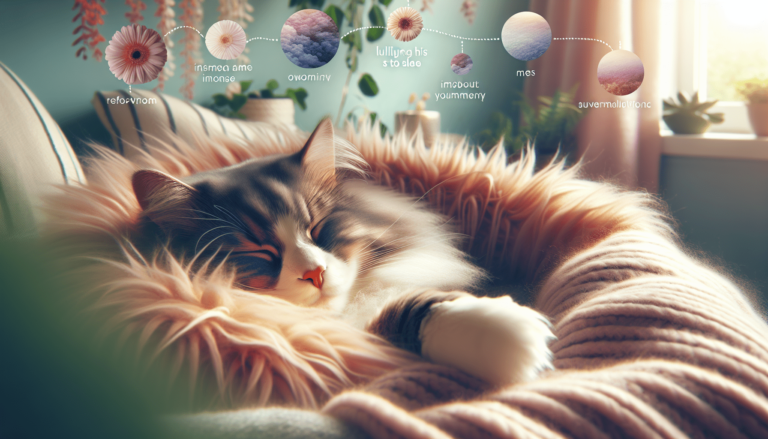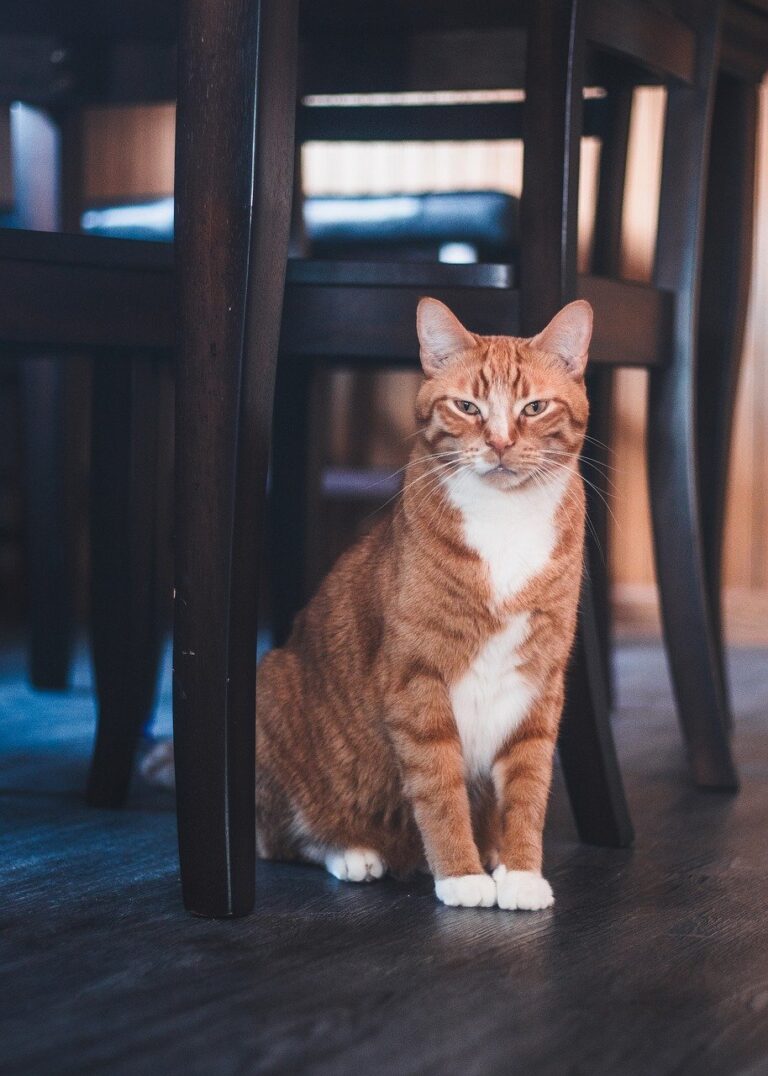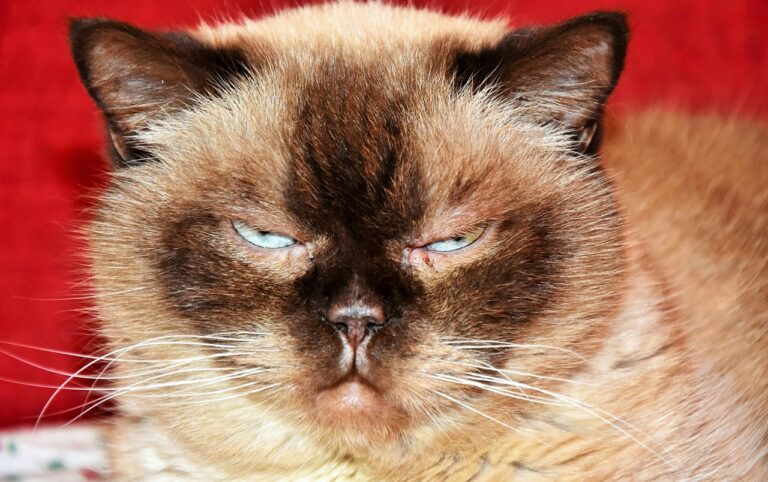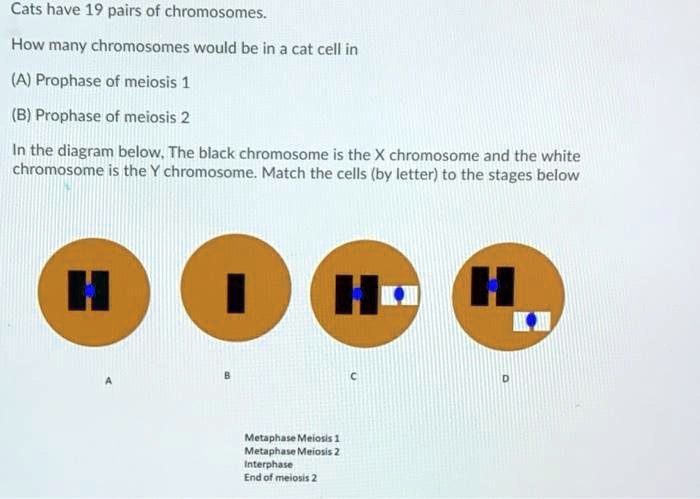Can Cats Eat Dog Food
If you’ve ever wondered whether it’s safe for your feline friend to indulge in a bowl of dog food, you’re in the right place. This article explores the intriguing question of whether cats can eat dog food. While these two household pets might share the same roof, their dietary needs and preferences differ greatly. Stay tuned to discover the potential consequences, nutritional differences, and expert advice on this curious matter. So, can cats really eat dog food? Let’s find out!
Understanding the Basic Nutritional Needs of Cats
Cats have unique nutritional requirements that are different from other animals, such as dogs. As obligate carnivores, cats require a diet that is primarily composed of animal-based proteins. This is because their bodies are designed to metabolize and utilize nutrients found in meat. Understanding the importance of a carnivorous diet for cats is crucial to ensuring their health and well-being.
The Importance of a Carnivorous Diet for Cats
Cats are obligate carnivores, which means they have a biological need for a diet that consists mainly of meat. Unlike humans and dogs, cats require certain essential nutrients, such as taurine, arachidonic acid, and vitamin A, that are found exclusively in animal tissues. These nutrients play a vital role in the overall health and proper functioning of a cat’s body. A diet that lacks sufficient animal-based proteins can lead to nutritional deficiencies and various health problems in cats.
Vitamins and Minerals Essential for Cats
In addition to animal-based proteins, cats require specific vitamins and minerals to maintain their overall health. Some of the essential nutrients for cats include vitamin D, vitamin E, vitamin B12, calcium, phosphorus, and magnesium. These nutrients are necessary for various bodily functions, including bone development, immune system support, and energy metabolism. Providing cats with a well-balanced diet that contains these essential vitamins and minerals is crucial for their long-term health and vitality.
Water Consumption for Hydration
Another crucial aspect of a cat’s diet is water consumption. Unlike dogs, cats have a relatively low thirst drive and rely heavily on obtaining moisture from their food. This is because their ancestors, such as wildcats, obtained most of their hydration from the prey they consumed. Therefore, it is essential to ensure that your cat has access to fresh water at all times and that their diet contains a sufficient amount of moisture. Adequate hydration is necessary for maintaining healthy kidney function, preventing urinary tract issues, and promoting overall well-being in cats.
Recognizing the Major Differences Between Cat and Dog Food
While it may be tempting to feed your cat dog food in certain situations, it is essential to understand the significant differences between cat and dog food. These differences extend beyond just the taste preferences of each species and have a direct impact on their nutritional needs. By recognizing the disparities, you can make informed decisions about which type of food is suitable for your feline friend.
Protein Content Comparison
One major difference between cat and dog food lies in the protein content. Cats require a much higher amount of protein in their diet compared to dogs. The protein requirement for cats is around 30-45% of their daily caloric intake, whereas dogs require a lower percentage. This is because cats have a higher metabolic rate and a greater need for amino acids, which are the building blocks of proteins, to support various physiological functions in their bodies. Feeding cat food to dogs, even in small amounts, can lead to an excess of protein and potential health issues for our canine companions.
Understanding Fiber Requirements
Another difference between cat and dog food lies in the fiber content. Cats are obligate carnivores, which means they have a limited ability to digest and utilize fibers effectively. On the other hand, dogs are omnivores and can handle a more substantial amount of dietary fiber. While dogs benefit from the fiber content in their food for better digestion and bowel regularity, excessive fiber in a cat’s diet can lead to digestive upset and nutrient malabsorption. Feeding a cat with dog food that contains higher levels of fiber can disrupt their digestive system and overall health.
Vitamin and Mineral Content Disparity
Cat food and dog food also differ in terms of vitamin and mineral content. Cats have specific dietary requirements for certain nutrients, such as taurine, arachidonic acid, and vitamin A, which are not present in sufficient quantities in dog food. For example, taurine is an essential amino acid for cats that helps maintain healthy heart function, vision, and reproductive health. Feeding dog food to cats that lack these essential nutrients can result in a deficiency and subsequent health problems.
The Consequences of Feeding Cats with Dog Food
Feeding cats dog food can have severe consequences on their health and well-being. It is crucial to recognize and understand these potential risks in order to provide optimal care for your feline companion.
Risk of Nutritional Deficiencies
One of the primary risks associated with feeding cats dog food is the potential for nutritional deficiencies. As discussed earlier, cats have specific dietary requirements that are not adequately met by dog food. Feeding your cat a diet that lacks essential nutrients, such as taurine, vitamin A, and arachidonic acid, can lead to deficiencies that affect their overall health and may result in irreversible damage to their organs or systems.
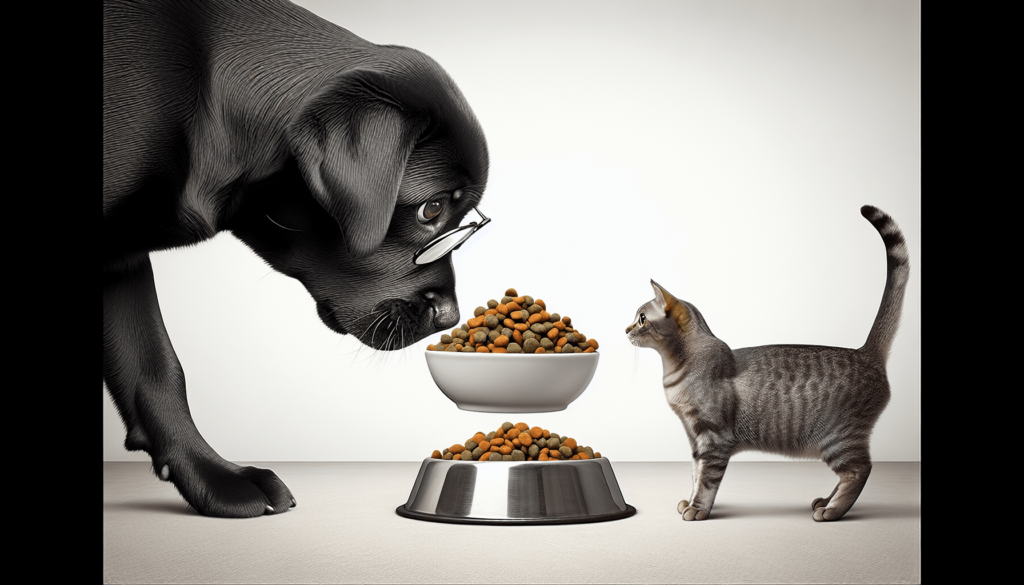
Potential Health Issues
Feeding cats dog food can also lead to various health issues. Cats that do not receive the proper nutrients from their diet may experience weakened immune systems, decreased energy levels, poor coat quality, and even organ dysfunction. Additionally, a lack of essential amino acids and vitamins can impair a cat’s vision, reproductive health, and heart function. To ensure the longevity and well-being of your cat, it is essential to provide them with a diet specifically designed to meet their unique nutritional needs.
Adverse Behavioral Changes
Another consequence of feeding cats dog food is the potential for adverse behavioral changes. Cats that are not receiving the proper nutrients may exhibit increased aggression, lethargy, or irritability. A cat’s behavior can be influenced by their overall physical health, and a diet lacking in essential nutrients can contribute to changes in their mood and temperament. Providing your cat with the appropriate nutrition through a balanced diet can help maintain their mental and emotional well-being.
Identifying the Key Ingredients in Dog Food that are Harmful to Cats
Certain ingredients commonly found in dog food can be harmful to cats. It is crucial to be aware of these ingredients to avoid potential health risks when considering alternative feeding options for your cat.
Certain Plant-based Materials
Dog food often contains plant-based materials, such as grains and vegetables, which are not suitable for cats. Cats lack the necessary enzymes to effectively digest and absorb nutrients from these plant materials. Feeding cat food that contains a high amount of plant-based ingredients can lead to digestive upset, nutrient deficiencies, and even the development of allergies in some cases. Cats require a diet primarily composed of animal-based proteins to meet their specific nutritional needs.
Lack of Taurine
Taurine is an amino acid that is essential for the health and well-being of cats. Unlike dogs, cats cannot synthesize taurine in sufficient quantities in their bodies and, therefore, must obtain it through their diet. Dog food often lacks adequate taurine content, as they do not have the same dietary requirement. Feeding cats dog food that is deficient in taurine can have severe consequences, including the development of heart disease, poor vision, and reproductive issues.
Excessive Carbohydrates
Dog food typically contains higher levels of carbohydrates compared to cat food. Cats have a limited ability to metabolize carbohydrates and primarily rely on proteins and fats for energy. Excessive carbohydrate consumption can lead to weight gain, obesity, and other related health problems, such as diabetes. Feeding cats dog food that is high in carbohydrates can disrupt their metabolism and lead to long-term health complications.
The Importance of Taurine in a Cat’s Diet
Taurine is an essential nutrient for cats that plays a vital role in maintaining their overall health and well-being. Understanding why taurine is crucial and the dangers of taurine deficiency can help ensure that your cat receives adequate amounts of this essential amino acid.
Understanding the Role of Taurine
Taurine is important for various physiological functions in a cat’s body. It is necessary for the development and function of the eyes, heart, immune system, and reproductive system. Taurine also aids in the digestion and absorption of fats and plays a role in regulating the cat’s metabolism. Cats have a higher requirement for taurine compared to other animals due to their limited ability to synthesize it in sufficient quantities.
The Danger of Taurine Deficiency
A deficiency in taurine can have severe consequences for cats. It can lead to a condition called taurine deficiency cardiomyopathy (DCM), which affects the heart’s ability to pump blood effectively. Cats with taurine deficiency may develop dilated cardiomyopathy, wherein the heart becomes enlarged and weakened. This condition can result in congestive heart failure, leading to lethargy, rapid breathing, and a decreased quality of life. It is important to provide cats with a diet that contains adequate levels of taurine to prevent these devastating health issues.
Why Dog Food Lacks Adequate Taurine
Dog food often does not meet a cat’s taurine requirements due to the difference in dietary needs between the two species. Dogs are capable of synthesizing taurine from other building blocks, such as cysteine, while cats have a limited ability to do so. Therefore, dog food formulations are not tailored to fulfill a cat’s specific taurine needs. Feeding cats dog food that is deficient in taurine over a long period of time can result in detrimental health effects and potentially life-threatening conditions.
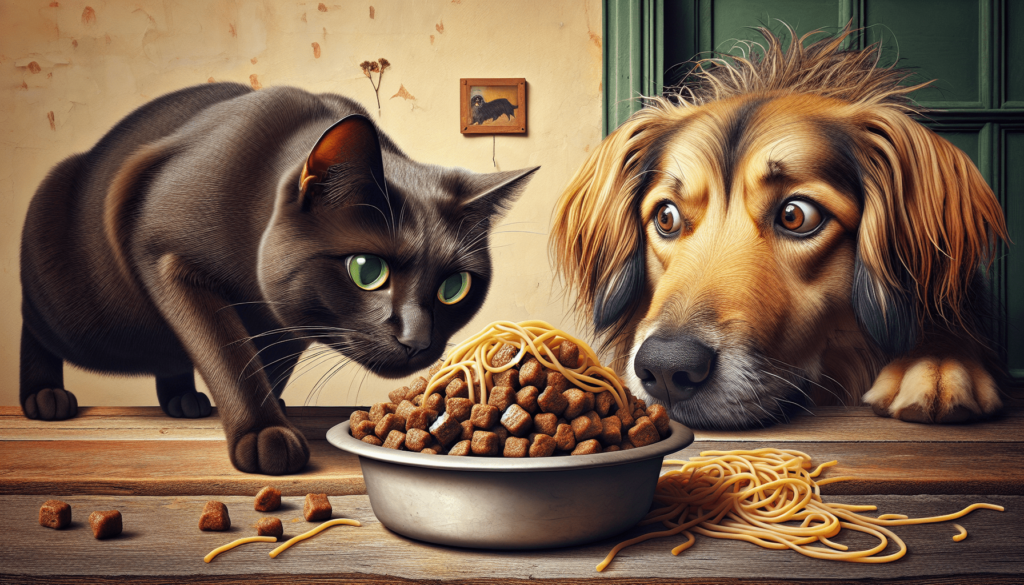
Effects of Feeding Cats Dog Food in the Long Run
Feeding cats dog food over an extended period of time can lead to various health issues and have a negative impact on their overall well-being. Understanding these potential effects can help pet owners make informed decisions about their cat’s dietary needs.
Potential for Weight Gain or Obesity
Dog food typically contains higher levels of carbohydrates and fats compared to cat food. Feeding cats dog food that is calorie-dense and high in carbohydrates can contribute to weight gain and obesity. Cats that are overweight or obese are at an increased risk of developing health problems such as diabetes, heart disease, and joint issues. Proper nutrition is crucial for maintaining a healthy weight and preventing these obesity-related conditions in cats.
Increased Risk of Diabetes
Feeding cats dog food that is high in carbohydrates can significantly increase their risk of developing diabetes. Cats have a limited ability to metabolize carbohydrates effectively, and a diet that is too high in carbs can lead to insulin resistance and subsequent diabetes. Diabetes in cats requires lifelong management and can have a significant impact on their quality of life. Providing cats with a low-carbohydrate diet, such as a species-appropriate cat food, can help prevent the development of this serious condition.
Potential for Heart Disease
As mentioned earlier, dog food often lacks adequate levels of taurine, which is essential for a cat’s heart health. Prolonged consumption of dog food deficient in taurine can lead to the development of heart disease, such as dilated cardiomyopathy. Cats with heart disease may experience symptoms such as coughing, difficulty breathing, and decreased exercise tolerance. It is crucial to prioritize a cat’s heart health by providing them with a diet that meets their taurine requirements.
Safe Alternatives for Emergency Situations
While feeding cats dog food should generally be avoided, there may be certain situations where it becomes necessary or unavoidable. In such cases, it is essential to consider safe alternatives to ensure your cat’s nutritional needs are met appropriately.
Occasional Human Foods Cats Can Eat
In emergency situations where cat food is not available, there are certain human foods that can be fed to cats as temporary alternatives. Plain cooked chicken, turkey, or fish can be a suitable, short-term option. These protein sources mimic the animal-based proteins found in cat food and can provide essential nutrients. However, it is important to avoid seasoning or adding any additional ingredients that may be harmful to cats, such as onions or garlic.
Short Term Use of Dog Food
In some situations where cat food is not readily accessible, such as during travel or unforeseen circumstances, a quality dog food can be used as a temporary solution. However, it is crucial to carefully select a dog food that closely matches a cat’s nutritional needs. Look for dog food options that are high in animal-based proteins and low in carbohydrates. Feeding dog food for an extended period can still pose health risks, so it should only be used as a temporary measure.
Purchasing Specially Formulated Cat Food
To ensure a cat’s long-term health and well-being, it is essential to provide them with a diet specifically formulated for their unique nutritional needs. Specially formulated cat food has the appropriate balance of animal-based proteins, essential nutrients, and moisture to support optimal health. It is crucial to choose a cat food that is high in quality and meets the nutritional guidelines set by reputable pet food organizations, such as AAFCO (Association of American Feed Control Officials).
Proper Feeding Practices for Multi-Pet Households
If you have both cats and dogs living in the same household, it is important to implement proper feeding practices to ensure each pet receives the appropriate nutrition without compromising their health.
Keeping Cat and Dog Food Separate
To prevent cross-contamination and unintentional feeding of the wrong food, it is essential to keep cat and dog food separate. Store their respective foods in different locations, ensuring that they are not accessible to the other pet. This will help prevent incidents where a cat mistakenly consumes dog food or vice versa.
Monitoring Eating Habits of Pets
Observing and monitoring the eating habits of pets is crucial to ensure that each animal is consuming their appropriate food. This can be particularly important when introducing a new pet to the household or if the pets have similar dietary requirements. By closely monitoring their meals, you can ensure that each pet is consuming the right food and the correct portion sizes.
Addressing Food Theft Issues Within Pets
In multi-pet households, some pets may exhibit food theft behavior, where they attempt to steal food from another pet’s bowl. This can be problematic, especially if a cat tries to eat dog food, as it may not meet their nutritional needs. To address this issue, feeding pets in separate areas or using feeding stations can help prevent food theft. Additionally, providing each pet with their own designated feeding time and individualized portion control can help ensure that they receive the appropriate diet.
Professional Guidance on a Cat’s Diet
Consulting a veterinarian for nutritional advice is always recommended when it comes to understanding a cat’s specific dietary needs. A veterinarian can provide professional guidance tailored to your cat’s individual health status, age, breed, and other relevant factors that may influence their nutritional requirements.
Understanding Breed-Specific Dietary Needs
Some cat breeds may have specific dietary needs or considerations that should be taken into account. For example, certain breeds may be more prone to food allergies or sensitivities, which may require specialized diets. Consulting with a veterinarian familiar with your cat’s breed or seeking advice from a veterinary nutritionist can help ensure that your cat’s diet is tailored to their specific needs.
The Bottom Line: Is Dog Food Safe for Cats?
In conclusion, while dog food may seem like a convenient alternative in certain situations, it is not safe or suitable as a long-term option for cats. The nutritional needs of cats differ significantly from those of dogs, and feeding cats dog food can lead to nutritional deficiencies, health issues, and adverse behavioral changes. Ensuring a proper diet that meets a cat’s specific nutritional requirements is crucial for their overall health, well-being, and longevity. Consultation with a veterinarian and the provision of specially formulated cat food are vital steps in providing optimal nutrition for your feline companion.
